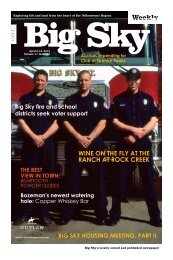health + wellness - Explore Big Sky
health + wellness - Explore Big Sky
health + wellness - Explore Big Sky
You also want an ePaper? Increase the reach of your titles
YUMPU automatically turns print PDFs into web optimized ePapers that Google loves.
<strong>health</strong> news<br />
Judge’s decision on<br />
medical marijuana<br />
caused confusion,<br />
halted changes<br />
by taylor anderson<br />
Last week the <strong>Big</strong> <strong>Sky</strong> Weekly reported<br />
on a medical marijuana business in<br />
Belgrade that was facing a possible end<br />
due to SB 423, an attempt to drastically<br />
change what’s become an industry<br />
in Montana.<br />
The following day, Judge Reynolds<br />
released a decision on a requested<br />
injunction by the Montana Cannabis<br />
Industry<br />
Association.<br />
The decision,<br />
released June<br />
30, said that<br />
caregivers<br />
(now called<br />
‘providers’) could still sell medicinal<br />
marijuana to approved patients. It also<br />
nixed the aspect of limiting doctors to<br />
approving 25 patients in 12 months so<br />
as to not place limits on their judgment<br />
of care.<br />
The judge’s decision at first appeared<br />
to allow the industry, which has<br />
boomed to 30,000 patients on July<br />
1, to continue its ways virtually<br />
unchecked. Rep. James Knox (R-<br />
Billings) initially called the ruling a<br />
“disappointment,” and a setback to the<br />
democratic process, before he found<br />
favorable aspects of the decision.<br />
After the shock of the decision passed,<br />
medical marijuana advocates realized<br />
that although several aspects of<br />
the law weren’t struck down, it may<br />
indeed restrict the industry.<br />
SB 423, which took place July 1 at<br />
midnight, stripped patients on<br />
probation of their cards immediately.<br />
Patients that qualified for a medical<br />
marijuana card under the claim of<br />
“chronic pain” would face stringent<br />
details (X-rays and MRIs) to prove<br />
the extent of the pain once their cards<br />
expire.<br />
Patients also have to choose whether<br />
they’d like to grow their own prod-<br />
ucts or have<br />
a designated<br />
provider, but<br />
they can’t<br />
have it both<br />
ways. Anyone<br />
accused of a<br />
DUI also voids their card under the<br />
new law. The law also allows officers<br />
with probable cause to check blood<br />
levels for THC, the active ingredient<br />
in marijuana, and sets a legal amount<br />
before patients are suspect to DUI.<br />
providers are subject to<br />
background checks on criminal<br />
and financial history, and can<br />
grow four mature plants for<br />
unlimited patients.<br />
Providers are subject to background<br />
checks on criminal and financial history,<br />
and can grow four mature plants<br />
for unlimited patients.<br />
SB 423, which was sponsored by Sen.<br />
Jeff Essmann (R-Billings), sought to<br />
ebb the amount of patients in Montana<br />
from 30,000 to just 2,000, and<br />
would have increased the cost for<br />
patients to receive their “card.” Initiative<br />
148, which passed in 2004 with<br />
62 percent of the vote, was repealed<br />
during the session before Gov. Brian<br />
Schweitzer vetoed the bill. The governor<br />
allowed SB 423 to take effect<br />
July 1 without his signature, despite<br />
speaking publicly against it.<br />
(Info provided by Montana NORML<br />
on blog.montananorml.org)<br />
In June, Senator Jon Tester (D-<br />
Mont.) created the bipartisan Senate<br />
Community Pharmacy Caucus.<br />
Tester and co-chairman Sen. Jerry<br />
Moran (R-Kan.) created the new<br />
caucus to fight for the needs of<br />
community pharmacies and the<br />
people they serve in rural America.<br />
Tester was the lead sponsor of<br />
legislation exempting many small<br />
pharmacies from unnecessary and<br />
expensive regulations that would<br />
have made it more difficult for<br />
Montana patients to get diabetic<br />
testing supplies.<br />
“Pharmacies provide essential services<br />
for Montana’s rural communities,”<br />
Tester said. “If folks in rural<br />
America don’t have access to life-saving<br />
medicine and medical supplies,<br />
rural America will disappear.”<br />
“Community pharmacy services<br />
are vital for improving <strong>health</strong> and<br />
reducing overall <strong>health</strong>care costs,”<br />
said Steven C. Anderson, IOM,<br />
CAE, President and CEO of the<br />
explorebigsky.com<br />
big sky weekly<br />
tester forms community<br />
Pharmacy caucus<br />
bipartisan senate Caucus to promote Montana’s<br />
rural pharmacies, access to <strong>health</strong> care<br />
by andrea hellinG<br />
If rural Montana is going to thrive,<br />
a new report suggests, it will take a<br />
resurgence of young people staying<br />
in - or returning to - their hometowns<br />
to pursue careers and raise<br />
families.<br />
Spokeswoman Alyssa Charney<br />
with the Center for Rural Affairs,<br />
which released the report, says the<br />
population in most rural areas is<br />
declining because of lack of access<br />
to things such as <strong>health</strong> care and<br />
<strong>health</strong> insurance.<br />
“A lot of that has to do with young<br />
people leaving, not necessarily because<br />
they don’t want to be living<br />
in those communities, but because<br />
the jobs that provide the benefits<br />
they need are often located outside<br />
of those communities.”<br />
Of the 15 million young adults in<br />
America now without <strong>health</strong> insurance,<br />
it’s estimated that 80 percent<br />
can get coverage under the Affordable<br />
Care Act. One key provision<br />
allows young people to stay on<br />
their parents’ <strong>health</strong> insurance un-<br />
National Association of Chain Drug<br />
Stores. “We look forward to working<br />
with the caucus to advance propatient,<br />
pro-pharmacy policies.”<br />
Montana has 222 community pharmacies.<br />
According to the National<br />
Community Pharmacists Association,<br />
Montana’s community pharmacies<br />
employ over 3,000 people.<br />
report: <strong>health</strong> care connected<br />
to Mt rural Population growth<br />
by deb Courson sMith<br />
til age 26. Another provision will<br />
establish <strong>health</strong>-care exchanges,<br />
which Charney calls critical in rural<br />
Montana, where small businesses<br />
are plentiful and many people -<br />
such as farmers and ranchers - are<br />
self-employed.<br />
The good news, Charney says, is<br />
the report’s conclusion that the Affordable<br />
Care Act will allow much<br />
more access to care and insurance<br />
for young adults - and that means<br />
more life options.<br />
“For young adults, it’s really important<br />
that limitations of <strong>health</strong><br />
insurance shouldn’t be the determining<br />
factors on where they<br />
choose to live, or the work they<br />
want to pursue, or their interests<br />
and passions.”<br />
The report on how the Affordable<br />
Care Act affects rural young adults,<br />
the latest in a series of reports from<br />
the Center for Rural Affairs which<br />
look at rural <strong>health</strong>-care issues, is<br />
online at files.cfra.org.<br />
July 15, 2011 37

















